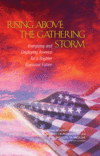 The first is Rising above the Gathering Storm: Energizing and Employing America for a Brighter Economic Future (or, RAGS), mandated by Congress and facilitated and published by the National Academies (2007). The goal of the report is noble; to best prepare the US citizens to leverage such things as conceptual understanding and technology to increase our standard of living. Cool. The problem is that we are way behind in not only leading the world in innovations, but even filling the expected wave of skilled careers that are expected. Uncool.
The first is Rising above the Gathering Storm: Energizing and Employing America for a Brighter Economic Future (or, RAGS), mandated by Congress and facilitated and published by the National Academies (2007). The goal of the report is noble; to best prepare the US citizens to leverage such things as conceptual understanding and technology to increase our standard of living. Cool. The problem is that we are way behind in not only leading the world in innovations, but even filling the expected wave of skilled careers that are expected. Uncool.Well, to "fix" this problem, one considers the low hanging fruit. We have lots of people in computing of a certain, dare I say, overrepresented demographic -- people like me. Fortunately this is not a new call (e.g., SIGCSE 2008 :-). So onto the people presently underrepresented, that should provide a rich source of competent and capable talent.
 Sadly, the answer appears to be no, as indicated in the second book, Stuck in the Shallow End: Education, Race, and Computing, by Jane Margolis. It seems that simple, tried-and-true teaching techniques (e.g., noticing and encouraging achievement, mentoring) are not as popular for these underrepresented groups as well might expect. Here is an interview with Jane Margolis as well.
Sadly, the answer appears to be no, as indicated in the second book, Stuck in the Shallow End: Education, Race, and Computing, by Jane Margolis. It seems that simple, tried-and-true teaching techniques (e.g., noticing and encouraging achievement, mentoring) are not as popular for these underrepresented groups as well might expect. Here is an interview with Jane Margolis as well.My intent with "diversity through accessibility" is to ensure that if we provide means for students to excel, then a more diverse groups will likely emerge. These reports suggest the complement; there are still too many unintentional obstacles that keep students stuck.
Well, two more books to read this summer.







